Key takeaways:
- Supplier audits are a comprehensive evaluation of practices, quality control, and regulatory compliance, requiring both documentation and sensory evaluation.
- Open communication and personal engagement during audits can uncover hidden challenges and foster collaboration for improvements.
- Preparation, objectivity, and clear documentation are essential for effective audits and impactful follow-up actions.
- Building strong relationships with suppliers enhances quality and fosters loyalty through acknowledgment and clear expectations.
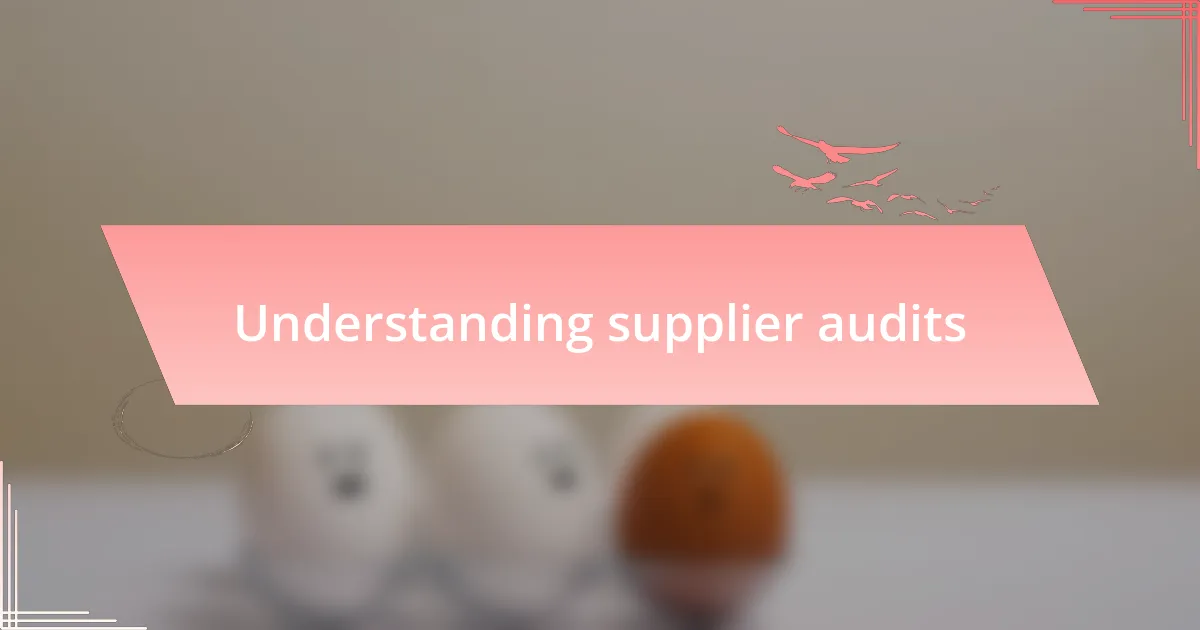
Understanding supplier audits
When I first embarked on supplier audits, I was both excited and a bit nervous; I wondered how deep the process would go. I soon realized that these audits are not just about checking boxes—they’re a comprehensive evaluation of a supplier’s practices, quality control, and regulatory compliance. Understanding this complexity reshaped my perspective; auditing became more of a journey than a task.
During my initial audits, I vividly remember walking through a facility and catching a whiff of something that didn’t sit right with me. It was an eye-opening moment, as it highlighted how crucial sensory evaluation is in the food industry. I learned that beyond documentation, there’s an intuitive side to audits that can reveal a supplier’s true commitment to quality.
In my experience, asking the right questions during an audit can make all the difference. I often reflect on conversations I’ve had with suppliers; their candidness about challenges sparked valuable insights. Have you ever wondered how much a supplier might hide behind polished reports? This personal engagement during audits not only builds trust but also fosters a collaborative approach to improving food safety and quality.
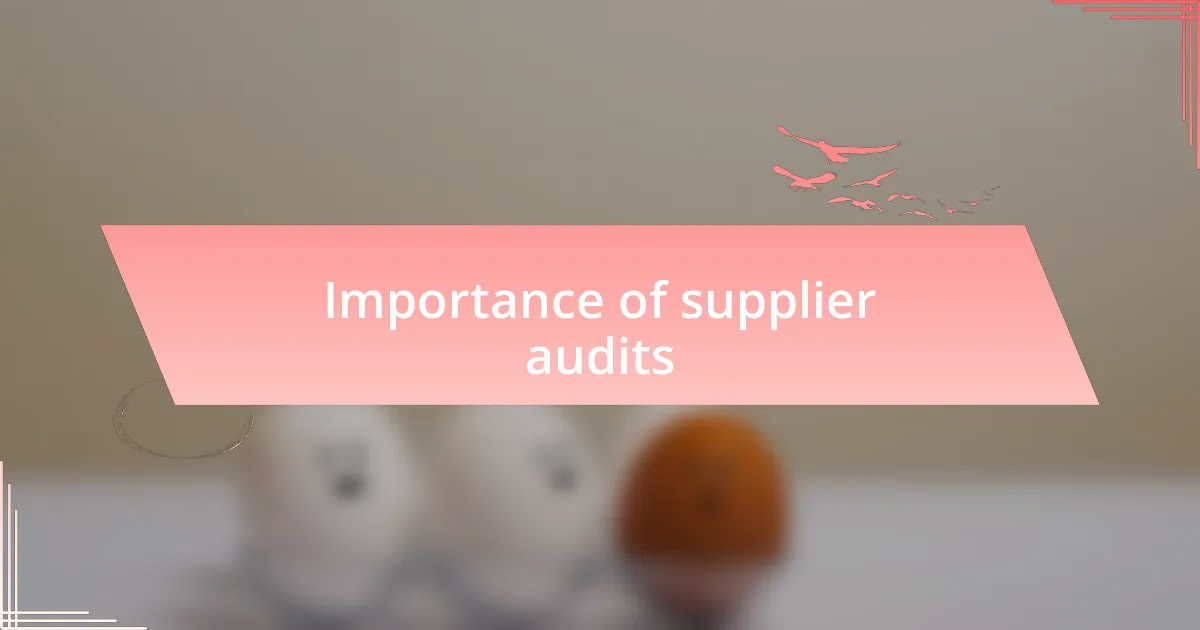
Importance of supplier audits
Supplier audits play a pivotal role in ensuring that the food supply chain remains safe and efficient. When I first reviewed a supplier’s compliance records, I discovered discrepancies that could have compromised food safety. It struck me how crucial these audits are not just for regulatory purposes but for protecting our customers and our brand reputation.
One striking memory I have involved a supplier who showcased their state-of-the-art facility but had insufficient training programs for their staff. This revelation made me realize that while equipment and technology matter, the people behind the processes are vital. Have you considered how a skilled workforce can dramatically elevate the quality of food products? I certainly did, and it reinforced my belief that audits must assess not only what’s visible but also the culture of safety within a supplier’s operations.
Reflecting on my experiences, I learned that good supplier audits can reveal hidden opportunities for improvement. During one audit, I engaged in a candid discussion about a supplier’s outdated practices. The openness of that dialogue led to actionable changes that benefitted both parties. Isn’t it fascinating how a single conversation can transform practices for the better? Through such exchanges, audits evolve into a tool for collaboration rather than just a checklist of compliance.
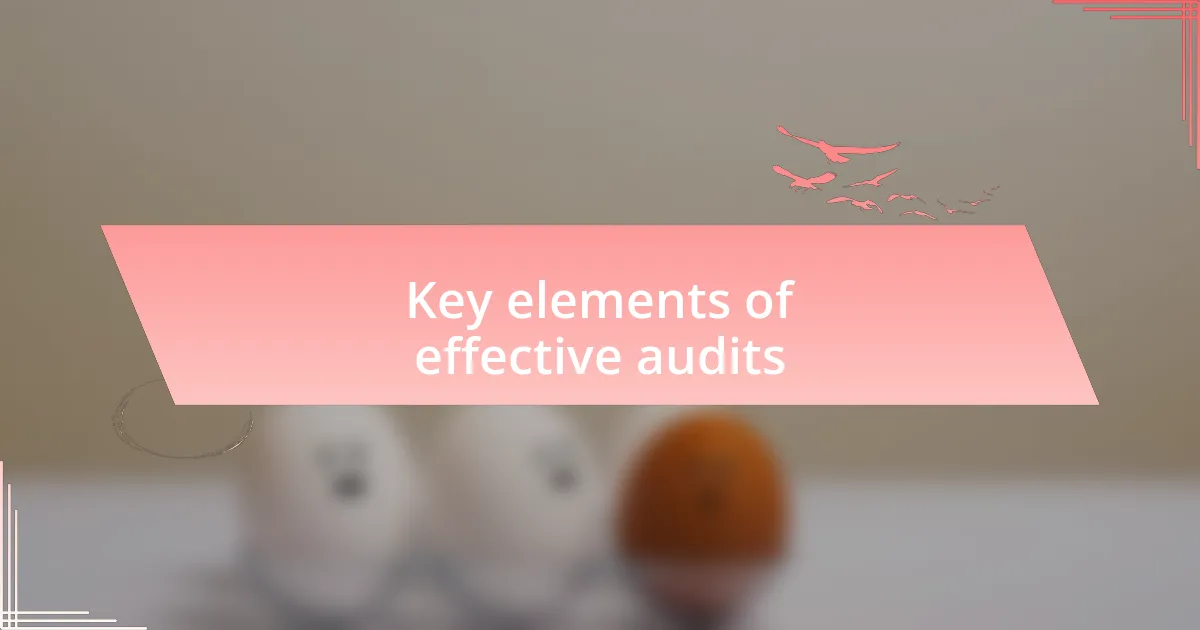
Key elements of effective audits
Effective audits hinge on several key elements that can make or break the process. One memorable audit involved a comprehensive assessment of a supplier’s documentation and processes. I was surprised to find that the strongest suppliers kept meticulous records and were always prepared to demonstrate their compliance rather than just arguing for it. Isn’t it impressive how thorough documentation not only reflects a commitment to quality but also builds trust?
Another essential aspect is the auditor’s ability to foster open communication. I recall a situation where I encouraged suppliers to share their concerns and suggestions freely. In that environment of trust, the suppliers revealed challenges they’d faced, leading to practical solutions that improved product quality. This experience taught me that effective audits must go beyond mere inspections; they should facilitate meaningful dialogue.
Lastly, I’ve found that follow-up is vital for ensuring continuous improvement. After an audit, I always make it a point to revisit the supplier a few months later to assess progress. This approach underscores the importance of accountability and reinforces our shared commitment to quality and safety. Have you ever noticed how accountability can drive real change? It certainly has in my experience, transforming initial findings into sustained improvements.
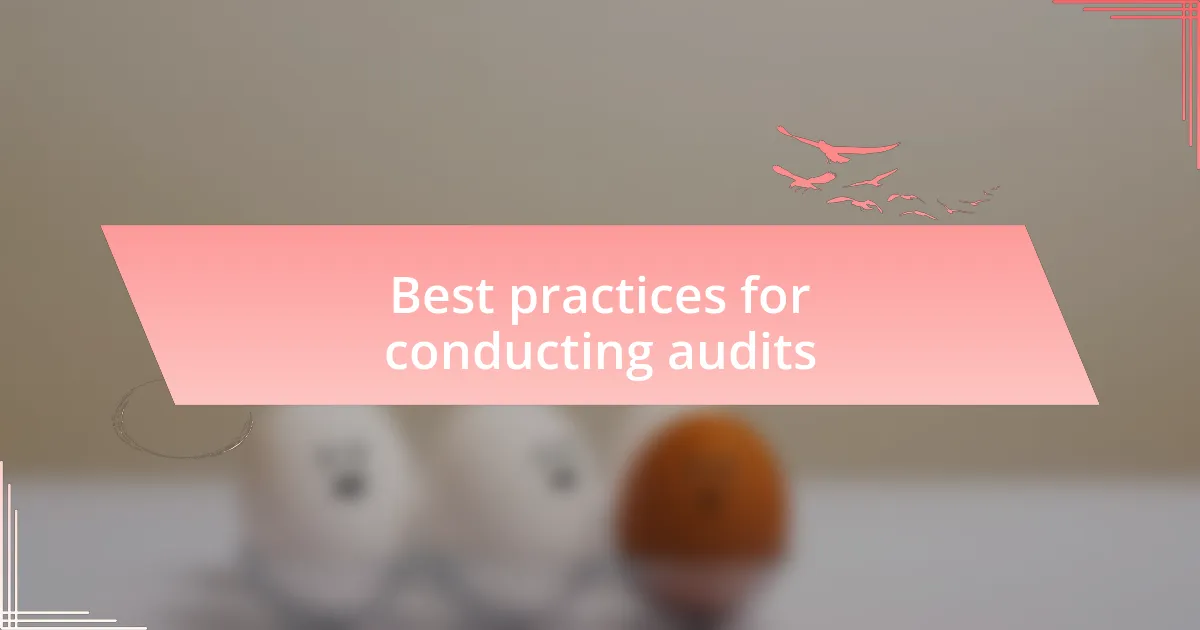
Best practices for conducting audits
When conducting audits, preparation is paramount. I learned this firsthand during an audit of a large food supplier. There were moments before the audit when I meticulously reviewed their previous records and compliance history. This groundwork not only made the day of the audit smoother but also helped me ask targeted questions that truly got to the heart of their operations. Isn’t it interesting how being well-prepared can uncover areas that might have easily been overlooked?
Another best practice that stands out is the emphasis on objectivity during the audit process. I’ve found that keeping personal biases at bay can significantly impact the quality of the findings. I remember one audit where my initial impression of a supplier was overly positive based on our past interactions. However, as I focused on the evidence gathered during the audit, I realized there were gaps that needed addressing. It was a tough realization, yet it reinforced the importance of sticking to facts rather than emotions. How often do we let our relationships cloud our judgment?
Finally, documenting findings with clear, concise reports is crucial for effective follow-up. I make it a point to craft these reports not just as a checklist, but as a narrative that tells the story of the audit. In one instance, a well-articulated report led to a decisive change in a supplier’s quality control process. It was gratifying to see that my detailed observations and recommendations had a tangible impact. Don’t you think that great documentation can serve as a powerful tool for change and improvement?
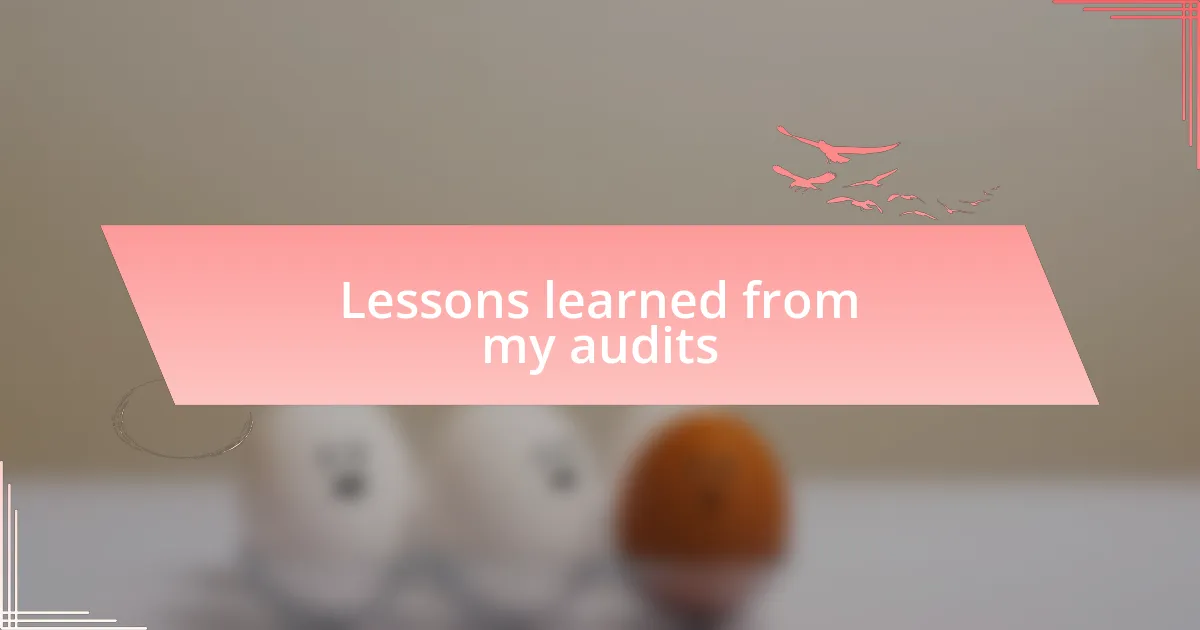
Lessons learned from my audits
During my audits, one vital lesson I learned is the importance of fostering open communication. I remember a particular audit where I took the time to sit down with the supplier’s employees at various levels. Their insights were invaluable and often highlighted areas of improvement that weren’t documented. Isn’t it fascinating how sometimes the most straightforward conversations can lead to profound discoveries about an organization?
Another significant takeaway was the need for flexibility during the audit process. While I had a structured approach, there were occasions when unexpected situations arose. For example, I encountered a supplier with a unique challenge that hadn’t been anticipated. By adapting my questions and methods on the spot, I gathered information that enhanced my understanding of their operations. Have you ever had to rethink your strategy to capture the full picture?
Lastly, I realized that building rapport with suppliers can lead to more fruitful audits. I recall a time when I shared a personal story related to food safety. This small moment of vulnerability opened the door to candid discussions about their challenges. It reinforced my belief that trust is a cornerstone in the auditing process. How often do we forget that behind every supplier are real people eager to improve?
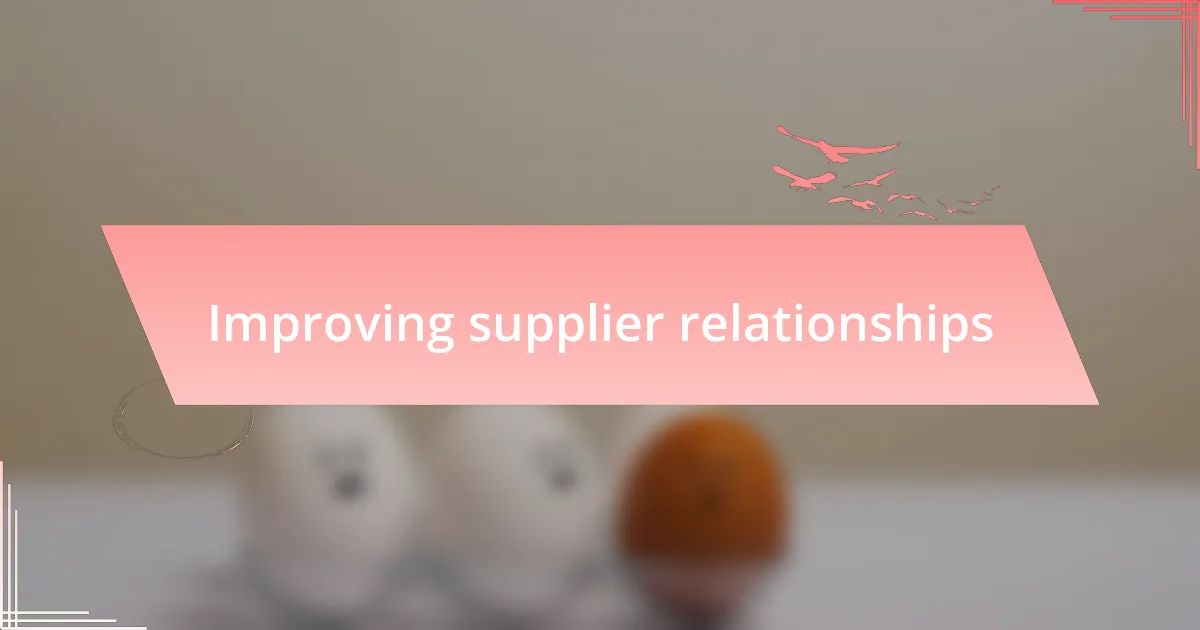
Improving supplier relationships
Building strong relationships with suppliers can dramatically enhance the quality of our food products. I once hosted a casual lunch with a supplier team, away from the formal audit setting, and the atmosphere shifted instantly. Sharing a meal allowed us to connect on a more personal level, leading to discussions about shared goals and mutual challenges. Don’t you think that sometimes, breaking bread can break down barriers?
Another aspect I discovered is the value of acknowledging suppliers’ efforts. During an audit, I made it a point to celebrate their successes, no matter how small. For instance, recognizing a supplier’s upgrade to more sustainable practices fostered a sense of pride among their team. When was the last time you praised someone for their hard work? A little appreciation can go a long way in nurturing loyalty.
Lastly, I learned that setting clear expectations can prevent misunderstandings down the road. In one instance, I had a supplier who was unclear about our quality standards. By outlining these expectations during our conversations, we not only clarified our priorities but also sparked collaborative discussions. Have you considered how clear communication can turn potential conflicts into productive partnerships?
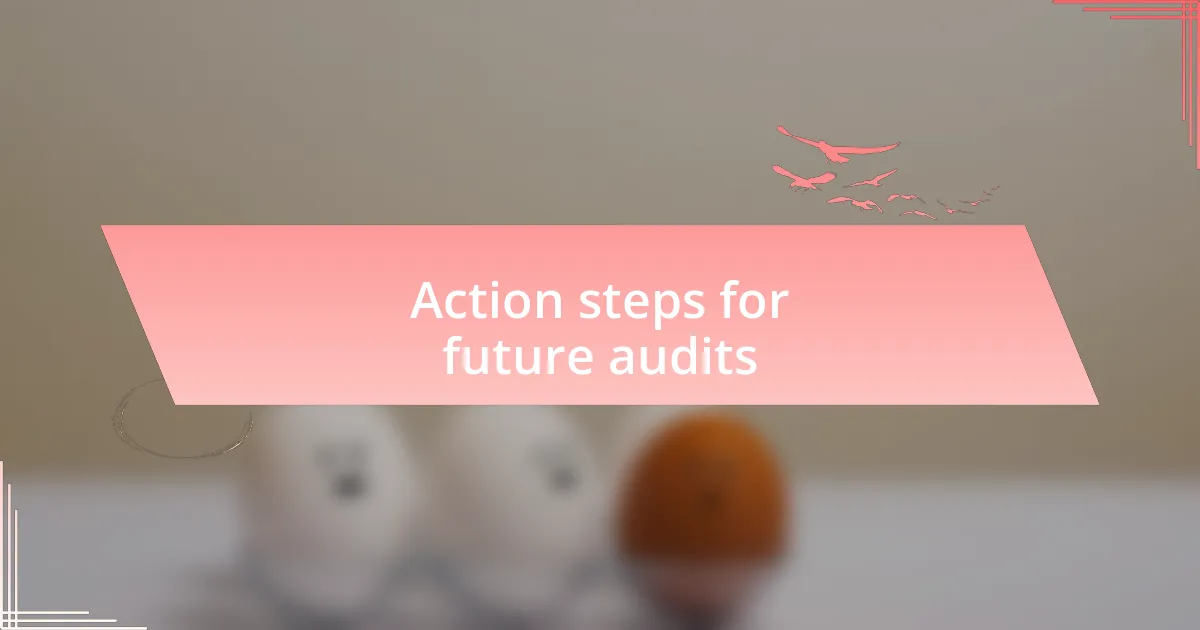
Action steps for future audits
One critical action step I’ve found invaluable for future audits is to create a structured feedback system. I implemented a simple process where team members could share their thoughts post-audit. This led to some surprising revelations about overlooked inefficiencies that affected our operations. Can you imagine how much insight is hidden without an open channel for honest feedback?
Another effective strategy involves comprehensive training for the audit team. After witnessing a few audits where team members felt unprepared, I arranged training sessions focused on specific industry standards and supplier expectations. This empowered my team, making them more confident during audits. Have you thought about how preparation could transform your audit experiences?
Lastly, I realized the importance of follow-up after an audit. In my experience, scheduling a follow-up meeting allows us to revisit the audit results and discuss progress. It’s fascinating how these discussions not only reinforce accountability but also foster a culture of continuous improvement. Wouldn’t you agree that closing the loop can lead to more meaningful supplier partnerships?